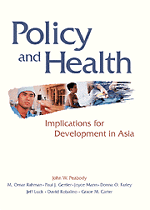Book contents
- Frontmatter
- Foreword
- Preface
- Contents
- Tables
- Figures
- Boxes
- Chapter One OVERVIEW: THE ROLE AND RESPONSIBILITY OF GOVERNMENTS IN THE HEALTH SECTOR
- Chapter Two EVIDENCE-BASED POLICY: USING DATA TO INFORM POLICY AND IMPROVE HEALTH OUTCOMES
- Chapter Three PRIORITIZING MEDICAL INTERVENTIONS: DEFINING BURDEN OF DISEASE AND COST-EFFECTIVE INTERVENTIONS IN THE PURSUIT OF UNIVERSAL PRIMARY CARE
- Chapter Four FINANCING AND ALLOCATING PUBLIC EXPENDITURES: LEVERAGING PUBLIC RESOURCES TO MEET OBJECTIVES AND INCREASE PRIVATE PARTICIPATION
- Chapter Five TOWARD BETTER EQUITY AND ACCESS: PERSISTENT POVERTY, INADEQUATE INTERVENTIONS, AND THE NEED FOR BETTER DATA AND SOLUTIONS
- Chapter Six GOVERNMENT AND THE IMPROVEMENT OF HEALTH BEHAVIORS
- Chapter Seven IMPLEMENTING POLICY OBJECTIVES: THE ROLE AND RESPONSIBILITIES OF THE MINISTRY OF HEALTH
- Acronyms
- Data Notes and Glossary—Chapter Two
- References
- Authors
- Index
- Plate section
Chapter Seven - IMPLEMENTING POLICY OBJECTIVES: THE ROLE AND RESPONSIBILITIES OF THE MINISTRY OF HEALTH
Published online by Cambridge University Press: 18 December 2009
- Frontmatter
- Foreword
- Preface
- Contents
- Tables
- Figures
- Boxes
- Chapter One OVERVIEW: THE ROLE AND RESPONSIBILITY OF GOVERNMENTS IN THE HEALTH SECTOR
- Chapter Two EVIDENCE-BASED POLICY: USING DATA TO INFORM POLICY AND IMPROVE HEALTH OUTCOMES
- Chapter Three PRIORITIZING MEDICAL INTERVENTIONS: DEFINING BURDEN OF DISEASE AND COST-EFFECTIVE INTERVENTIONS IN THE PURSUIT OF UNIVERSAL PRIMARY CARE
- Chapter Four FINANCING AND ALLOCATING PUBLIC EXPENDITURES: LEVERAGING PUBLIC RESOURCES TO MEET OBJECTIVES AND INCREASE PRIVATE PARTICIPATION
- Chapter Five TOWARD BETTER EQUITY AND ACCESS: PERSISTENT POVERTY, INADEQUATE INTERVENTIONS, AND THE NEED FOR BETTER DATA AND SOLUTIONS
- Chapter Six GOVERNMENT AND THE IMPROVEMENT OF HEALTH BEHAVIORS
- Chapter Seven IMPLEMENTING POLICY OBJECTIVES: THE ROLE AND RESPONSIBILITIES OF THE MINISTRY OF HEALTH
- Acronyms
- Data Notes and Glossary—Chapter Two
- References
- Authors
- Index
- Plate section
Summary
OVERVIEW
We argued in Chapter 1 that when governments pursue health-sector activities, their efforts are driven from the top down by a set of broad health-sector objectives. Governments seek to improve health status, ensure equity, and insure against catastrophic illness. Establishing and prioritizing those objectives is challenging enough, but governments have the much harder problem of managing the health-sector operations that derive from those objectives. Translating those objectives into operational programs is a difficult management task.
Just exactly how hard it is to manage health-sector activities is illustrated by the difficulties China has had during its reform efforts. A decade ago, Chinese macro health policy shifted health care financing and delivery activities toward a free market system. All levels of health facilities were encouraged to rely on user fees to support their operations. For political reasons, China continued its system of administered prices so that public hospitals continued to be run by the government. The government hospitals were only funded for basic wages and capital. User fees were intended to cover all other hospital costs. The government then set prices of many basic services at less than or equal to cost, while allowing higher prices to be charged for certain imported drugs and new high-technology procedures. Thus, hospitals and providers were able to make a profit on these services, which they could use to subsidize basic services and to award wage bonuses.
- Type
- Chapter
- Information
- Policy and HealthImplications for Development in Asia, pp. 276 - 328Publisher: Cambridge University PressPrint publication year: 1999



